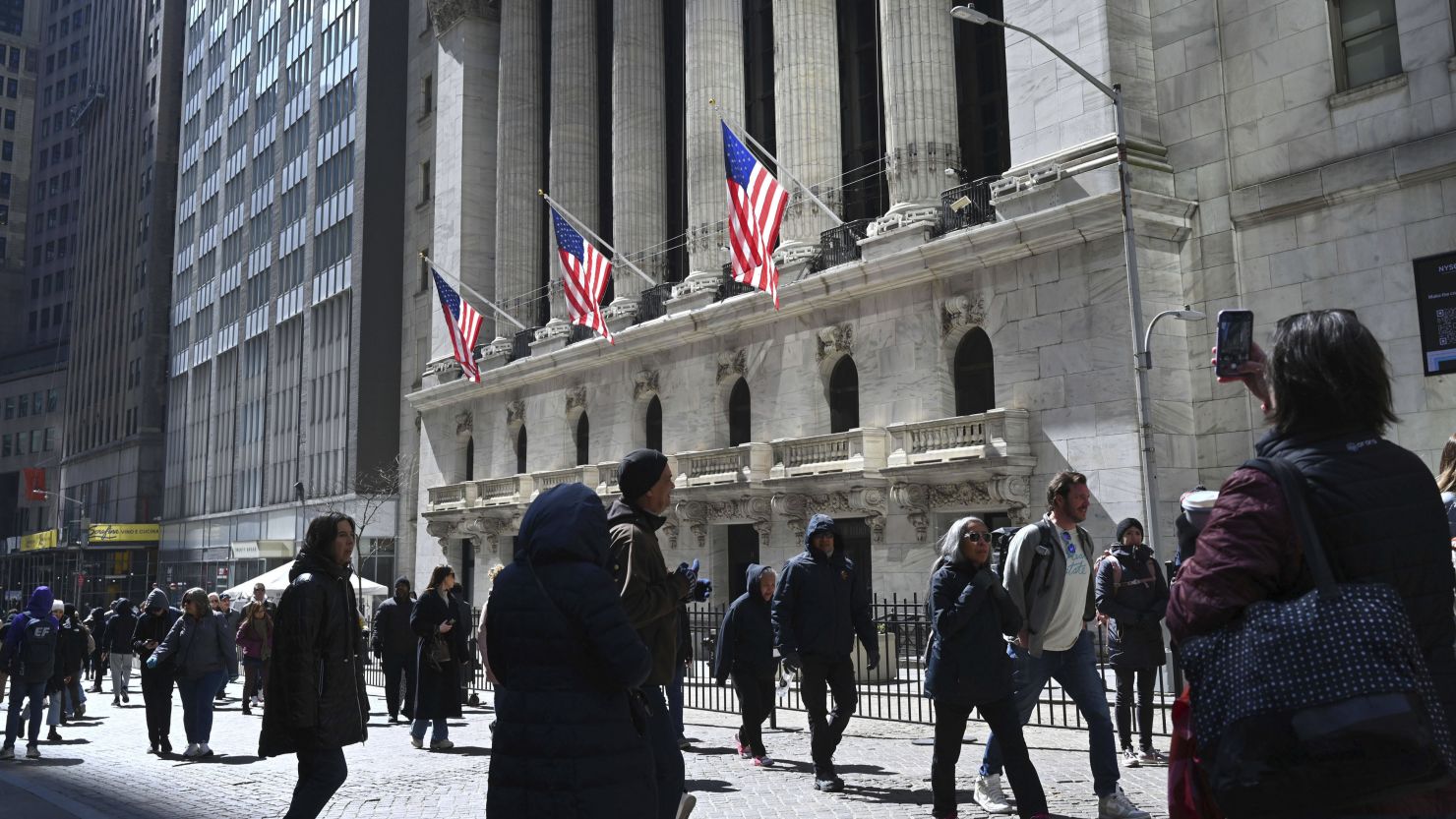A version of this story first appeared in CNN Business’ Before the Bell newsletter. Not a subscriber? You can sign up right here. You can listen to an audio version of the newsletter by clicking the same link.
Stocks tumbled on Thursday, reversing earlier gains mid-afternoon ahead of the latest jobs report due Friday.
The Dow Jones Industrial Average slumped 530 points, or 1.4%, on Thursday, after swinging 800 points during the day. The blue-chip index closed below the 39,000 level for the first time since mid-March.
The S&P 500 fell 1.2% and the Nasdaq Composite slid 1.4%.
Minneapolis Federal Reserve President Neel Kashkari said Thursday that it’s possible the central bank won’t cut rates this year if inflation remains persistent, spooking investors already concerned that the Fed could delay paring back rates.
That adds to what’s already been a rough start to the second quarter, after stocks notched their best beginning to the year since 2019. The S&P 500 has declined 2% for the week after paring back some of its losses on Wednesday. The 10-year US Treasury yield on Tuesday leapt to its highest level since last November. Gold and oil prices are rising.
What’s going on? Here are three things giving investors the jitters.
Stubborn inflation. The Personal Consumption Expenditures price index, the Fed’s preferred inflation gauge, rose 2.5% for the 12 months that ended in February. While that was in line with expectations from economists polled by FactSet, it was a faster clip than January’s 2.4% increase.
Investors have warned that signs of persistent inflation could derail the interest rate cut in June or July that many traders are anticipating.
“Given the latest numbers, we remain skeptical that the Fed will move on rates by the beginning of summer,” wrote Brent Schutte, chief investment officer at Northwestern Mutual Wealth Management, in a Monday note.
Long-term bond yields have surged this week, weighing on stocks. While they pulled back on Thursday, they remain elevated. The 10-year Treasury yield fell to 4.31% on Thursday, easing back from a four-month high.
Hawkish Fed speak. Some Fed officials revealed at the central bank’s policy meeting last month that they see fewer rate cuts than the three they forecast last December for 2024.
Currently, the Fed’s target interest rate is between 5.25% and 5.5%, according to the central bank’s latest set of economic projections. Four of the 19 officials on the committee now see rates staying above 5% this year — suggesting they see one or no rate cuts.
Central bank officials have in recent weeks doubled down on their expectation that rates will remain higher for longer.
• Fed Chair Jerome Powell said that rate cuts won’t be imminent at an event held by the San Francisco Fed last Friday. He reiterated that warning during a speech at Stanford University on Wednesday.
• Cleveland Fed President Loretta Mester ruled out the possibility of a cut next month in prepared remarks on Tuesday.
• Atlanta Fed President Raphael Bostic told CNBC on Wednesday that he sees one rate cut this year during the fourth quarter as inflation stays sticky on its path to 2%.
Jumping commodities prices. The price of US oil soared to a five-month high as escalating conflict in the Middle East stoked concerns about curtailed crude supply.
Production cuts from OPEC+, the Organization of the Petroleum Exporting Countries and its allies, added more upward pressure on prices. West Texas Intermediate crude, the US benchmark, settled at $86.59 on Thursday. Brent crude futures, the international benchmark for oil, settled at $90.65.
Bank of America strategists said they expect oil prices to peak at around $95 a barrel this summer.
“With Middle East tensions on the rise, OPEC+ supply side measures have pushed crude oil volatility down,” BofA strategists wrote in a Wednesday report. “Adding to a complex backdrop, we now estimate that improving economic growth expectations have helped push global oil markets into a deficit.”
The price of gold has also climbed this week. Investors tend to seek out the yellow metal when inflation spikes, betting that it will hold its value even as other assets don’t. Gold is also perceived as a haven. The price of the most actively traded gold futures contract settled at $2308.50 a troy ounce on Wednesday, retreating from a record high.
Two investors in Trump Media insider trading case plead guilty
Florida venture capitalist Michael Shvartsman and his brother Gerald Shvartsman pleaded guilty on Wednesday to participating in an insider trading scheme linked to the blockbuster deal that brought former President Donald Trump’s social media business public, reports my colleague Matt Egan.
Each of the brothers pleaded guilty in New York to one count of securities fraud, which carries a maximum sentence of 20 years in prison, according to federal prosecutors.
The two brothers were arrested in June and charged with illegally trading on nonpublic knowledge of a shell company’s secret plan to buy Trump Media & Technology Group, the parent company of struggling social network Truth Social.
“Michael and Gerald Shvartsman admitted in court that they received confidential, inside information about an upcoming merger between DWAC and Trump Media and used that information to make profitable, but illegal, open-market trades,” Damian Williams, the US Attorney for the Southern District of New York, said in a statement.
The indictment accused the brothers and a third individual, Bruce Garelick, of together making more than $22 million in October 2021 by trading on their inside knowledge of the deal.
Shares of the shell company, Digital World Acquisition Corporation, spiked after the blank-check company publicly announced an agreement to merge with Trump Media.
“Insider trading is cheating, plain and simple,” Williams said, “and today’s convictions should remind anyone who may be tempted to corrupt the integrity of the stock market that it will earn them a ticket to prison.”
US government review faults Microsoft for ‘cascade’ of errors that allowed Chinese hackers to breach senior US officials’ emails
Microsoft committed a “cascade” of “avoidable errors” that allowed Chinese hackers to breach the tech giant’s network and later the email accounts of senior US officials last year, including the secretary of commerce, a scathing US government-backed review of the incident has found.
The hack “was preventable and should never have occurred,” says a report released Tuesday by the US Cyber Safety Review Board (CSRB), a group of government and private cybersecurity experts led by the Department of Homeland Security. It was set up by President Joe Biden in 2021 to study the root causes of major hacking incidents.
In particular, the review board faulted Microsoft (MSFT) for not adequately protecting a sensitive cryptographic key that allowed the hackers to remotely sign into their targets’ Outlook accounts by forging credentials, reports my colleague Sean Lyngaas.
“Microsoft’s security culture was inadequate and requires an overhaul” in light of the company’s “centrality in the technology ecosystem,” the report concludes.
The hack roiled Washington and gave Chinese operatives access to the unclassified email accounts of senior US diplomats, including US Ambassador to China Nicholas Burns, on the eve of a high-profile visit by Secretary of State Antony Blinken to China last June, CNN has reported.





